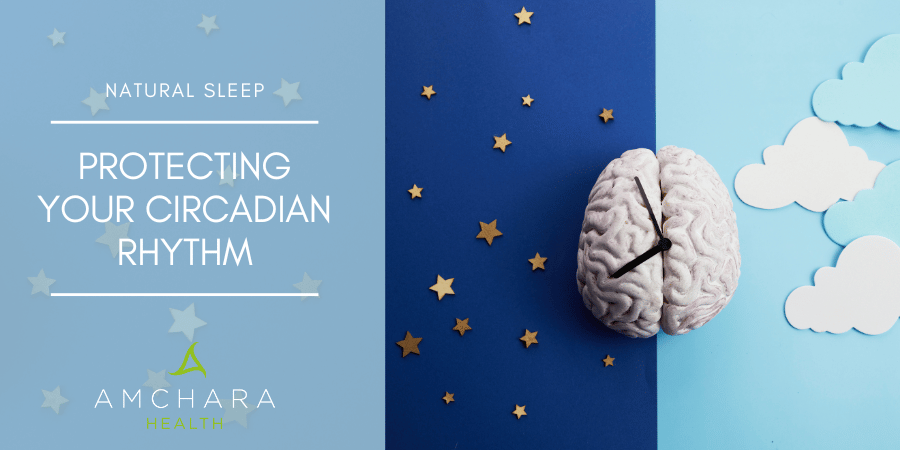Topics Covered in this article:
We are all running on a 24-hour clock with our sleeping and waking system and it is important to focus on protecting and nourishing this to achieve a healthy and balanced lifestyle. With the noises of city life, artificial lighting and electronic device impact, fine tuning and protecting our circadian rhythm can become a challenging task.
We always take an evidence-based approach and aim to provide you with actionable knowledge and tips to help you on your journey to optimal health.
There is a vast amount of information into the different levels of sleep you can encounter and problems that can occur due to elements beyond your control, so at Amchara we have conducted thorough research into some common problems, with suggested solutions by those who are experts in this fascinating field.
What is the circadian rhythm?
The first point to understand is what exactly the circadian rhythm is, how it works and how important it is in contributing to the production of good sleep.
The name “circadian” comes from the latin phrase of “circa diem”, which translates to “around a day”, and that’s what the rhythm is all about. It is a system in place that keeps you on a 24-hour pattern between waking and sleeping, ensuring your body is processing what it needs to at the right points throughout this cycle.
Without the circadian rhythm, your body wouldn’t comprehend when to begin its necessary work to function effectively. It calls your body to digest and produce proteins at the right time of day, and positions your body to release hormones when it needs to for energy expenditure.
It even encourages you to eat at regular times to promote intelligent digestion, and evidently, it brings you closer to the right time of night where you can sleep, rest and recuperate.
Unsurprisingly, the most influencing factor to the circadian rhythm is light. Light is the signpost for our system to understand where we are in the 24-hour clock, and remarkably the circadian rhythm recognises this and works with this information.
This is where it will wake you at the right point in the morning, or send signals, through melatonin production, for sleep at the dark points of the night.
What can push the circadian rhythm out of sync?
As mentioned, research shows that light is the highest contributing factor to the circadian rhythm. Therefore it is no surprise that in our modern world, blue and artificial light from devices and electronics can alter our rhythm so much that it can throw us out of sync.
The solution for this is simple – limit the exposure.
It is suggested that we minimise or remove artificial or blue light from view for up to an hour before we intend to fall asleep.
By doing this, you are reducing the amount of disturbing elements impacting your system, which will therefore enable your body and circadian rhythm to work to its best ability, securing you a solid night of sleep and a waking window that doesn’t leave you feeling groggy.
There are other lifestyle choices which can lead to more serious issues and can alter our system, which are important to understand and avoid if possible.
Jet Lag Disorder – This is a term used for those who are crossing time zones on a regular basis, so therefore aren’t able to catch up with their sleep at the right time. This disorder can only be remedied by settling into your new timezone and following the cues of the night and day.
If you are doing this for recreational purposes then it is good to understand that it is a temporary issue that will be fixed over time, but if you are constantly travelling it is worth trying to work a way into pre-empting your system into your new time zone by adjusting your sleep if possible.
Shift Work Disorder – Many of us have complicated lifestyles and schedules which can be made worse by unsociable working hours, and this affects your circadian rhythm hugely. This negative effect is caused by needing to be awake and alert during dark hours, and needing to rest and relax during our light time.
As we discussed previously, light is a huge contributing factor for the circadian system so it’s natural that it will be off schedule if we are fighting against it.
There are a lot of advances that can help us with this now, such as waking lights that can produce UV style lighting to raise you from your sleep in the dark, and blackout blinds that can completely eliminate daylight if you are trying to rest in the day.
They are worth the investment to try and maintain some level of circadian rhythm if this is a lifestyle you will be undertaking.
Delayed Sleep Phase Disorder – Fewer than 2 out of 1000 people suffer this problem with sleep but it is not completely uncommon. This is the issue of staying up late into the night and waking late in the morning, so missing the crucial sunrise waking window.
Whilst the majority of adults do not live this lifestyle, the younger generation, specifically teenagers can be very partial to adopting this pattern. This can be very destructive to the circadian rhythm, and for teenagers it can be particularly negative in terms of impact, due to the pressures of school and examinations.
This can leave people feeling unwell or incapable of focusing during important parts of the day as the rest of the body’s system will be struggling to keep up due to missing vital cues. Again, many teenagers will be using electronic devices so restricting the use of these at night is one useful step to help encourage a good sleep pattern.
Protecting your circadian rhythm
There are many easy steps you can take to protect your body and sleep system, some of which we have already discussed.
Reducing your caffeine and sugar intake can have huge effects on our ability to rest, and it’s a simple action to take. Stimulants are in so much food and drink such as tea, coffee, soft drinks and chocolate.
Not only will reducing the intake of caffeine help your sleep, it will also be beneficial for your digestive system.
Staying hydrated is also a huge factor for good brain and blood health so stay on top of your water intake.
A difficult task during our winter months where our sun can be largely absent, but natural light can have brilliant results on our sleep schedules.
Falling asleep with the curtains or blinds partially open so when the sun rises, it naturally wakes you and can help your body understand the 24-hour clock in a much more organic way.
There are also a number of UV and daylight lamps that can assist with waking you in a natural way rather than a shocking phone alarm.
Takeaway
Why not come to one of our retreats based in some of the most beautiful landscapes our world can offer?
Our Somerset Amchara retreat, based in the idyllic English countryside, and our Malta location, based on the mesmerising island of Gozo provide a Personalised Health experience for anyone who wishes to improve their physical health, emotional wellbeing and lifestyle in a positive, sustainable way.
We have a wealth of knowledgeable Personalised Health practitioners who can guide you through lifestyle changes that you can undertake if sleep is beginning to become an issue, and provide you with nutritious eating plans that can support your brain health.
We always employ a tailored approach, taking into account your individual circumstances.
Taking a break from the day to day stresses of life can give you the opportunity to really tune in to your 24-hour clock and give your circadian rhythm the chance to get back on track, with the added bonus of being in a relaxing and restorative environment.
Rest and relaxation are key to good sleep and we promote that wholly at our Amchara retreats.
Prior to leaving you will have a 1:1 health review with our Personalised Health experts to assess how the retreat has worked for you, and what you can take away to adapt into your lifestyle when you return home.
Time spent on a detox retreat is an investment in your health and a nurturing gift to yourself on your path to happiness and optimal health.




